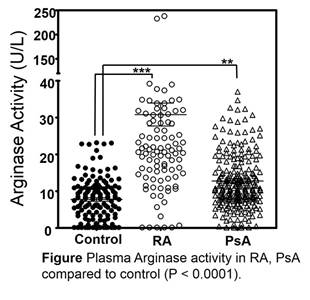Session Information
Date: Monday, November 6, 2017
Title: Spondyloarthropathies and Psoriatic Arthritis – Pathogenesis, Etiology Poster II
Session Type: ACR Poster Session B
Session Time: 9:00AM-11:00AM
Background/Purpose: A high prevalence of CVD exists among patients with PsA and RA. The cardiovascular morbidity and mortality are hypothesized to be due in part to persistent systemic inflammation. Chronic inflammation promotes endothelial dysfunction with reduced vascular reactivity, leading to CVD. L-arginine metabolism is critical for maintaining normal endothelial homeostasis, and arginases are the central enzymes in the urea cycle that catalyze L-arginine to L-ornithine and urea. L-arginine is also the sole source of nitric oxide (NO), an enhancer of endothelial function as well as modulator of insulin sensitivity, whose production is catalyzed by NO synthases (NOS). Elevated arginase activity diminishes L-arginine bioavailability, thus decreasing NO production, which may lead to CVD by promoting endothelial dysfunction. Furthermore, elevated arginase activity leads to excessive production of ornithine leading to vascular problems. The aim of this study is to identify specific pathways leading to aberrant L-arginine metabolism as a potential cause of the increased CVD risk observed in RA and PsA patients.
Methods: Liquid chromatography-mass spectrometry was used to measure plasma levels of L-arginine and its metabolites [L-ornithine, L-citrulline, asymmetric dimethylarginine (ADMA) and symmetric dimethylarginine (SDMA)]. Global arginine bioavailability ratio (GABR, ratio of L-arginine to L-ornithine + L-citrulline) and arginine methylation index (ArgMI, ADMA + SDMA/MMA) values in RA and PsA were compared to those in control subjects. Plasma arginase activity was measured using Quantichrom Arginase Assay kit, according to the manufacturer’s instructions. Correlations between L-arginine metabolites and cardiovascular risk factors are analyzed using sperman correlation.
Results: There was a 400% and 160% increased level of plasma arginase activity in RA (n=119) and PsA (n=233) subjects, respectively, as compared to controls (n=148). Also, RA patients with existing CVD had higher arginase activity than RA patients without CVD. In addition, we found increased abundance of methylated arginines in RA and PsA. Compared to controls, the RA patients showed significantly lower levels of plasma L-arginine, and GABR and elevated levels of ADMA, SDMA and ArgMI. Arginase activity and L-ornithine were elevated in RA, while the level of L-citrulline was diminished. In comparison to controls, the PsA patients also showed lower levels of plasma L-arginine as well as elevated levels of plasma ADMA and SDMA.
Conclusion: Elevated plasma arginase activity and dimethylarginine in RA and PsA subjects may contribute to impair NO generation, which may lead to accelerated atherosclerosis. Future studies should explore potential therapeutic interventions targeting dysregulation of arginine metabolism.
To cite this abstract in AMA style:
Husni ME, Rai V, Leon Rabanal M, Chandrasekharan U. Increase in Arginase Activity and Related Arginine Metabolites in Patients with Rheumatoid Arthritis (RA) and Psoriatic Arthritis (PsA): Potential Mechanisms for Endothelial Dysfunction [abstract]. Arthritis Rheumatol. 2017; 69 (suppl 10). https://acrabstracts.org/abstract/increase-in-arginase-activity-and-related-arginine-metabolites-in-patients-with-rheumatoid-arthritis-ra-and-psoriatic-arthritis-psa-potential-mechanisms-for-endothelial-dysfunction/. Accessed .« Back to 2017 ACR/ARHP Annual Meeting
ACR Meeting Abstracts - https://acrabstracts.org/abstract/increase-in-arginase-activity-and-related-arginine-metabolites-in-patients-with-rheumatoid-arthritis-ra-and-psoriatic-arthritis-psa-potential-mechanisms-for-endothelial-dysfunction/

